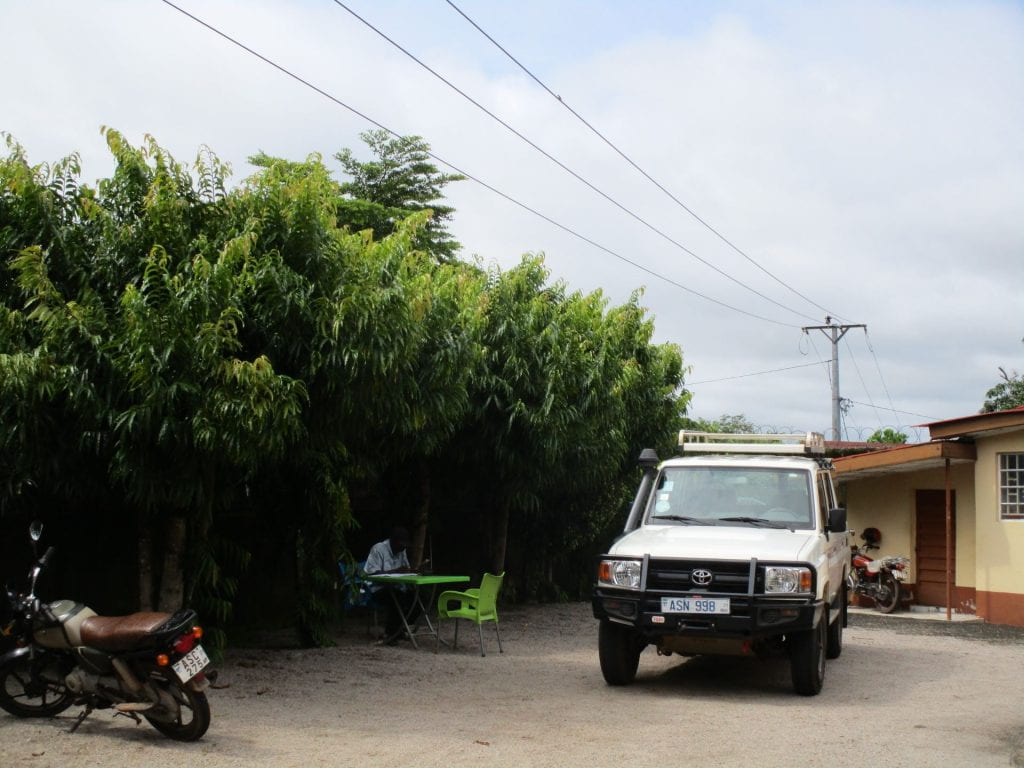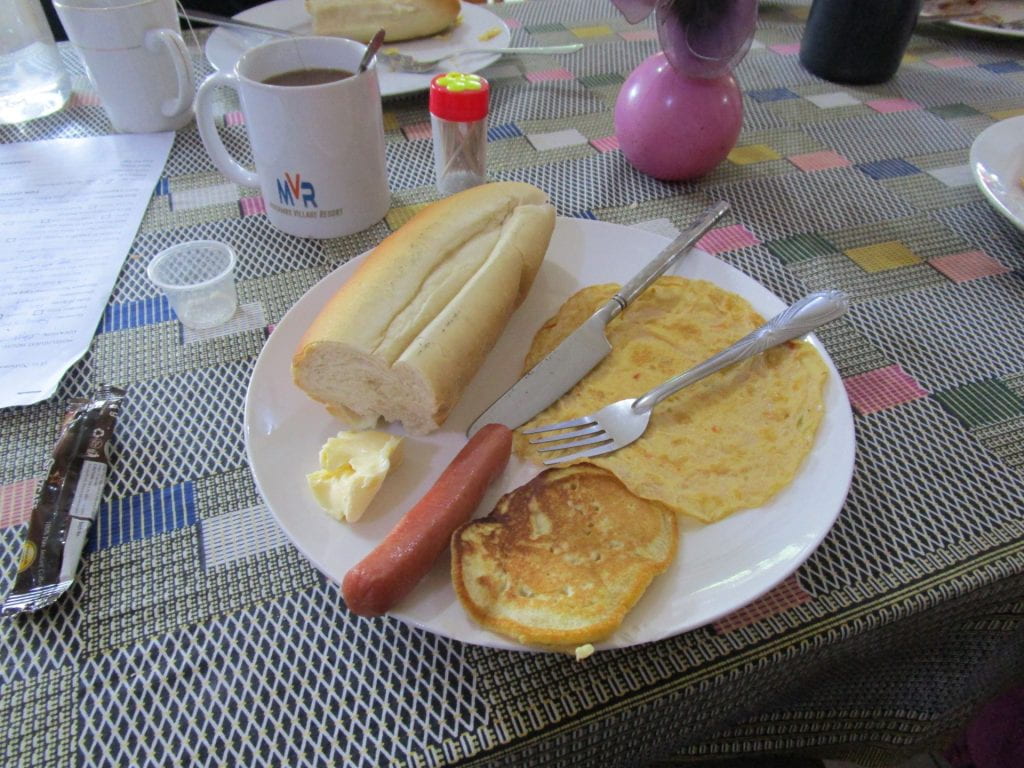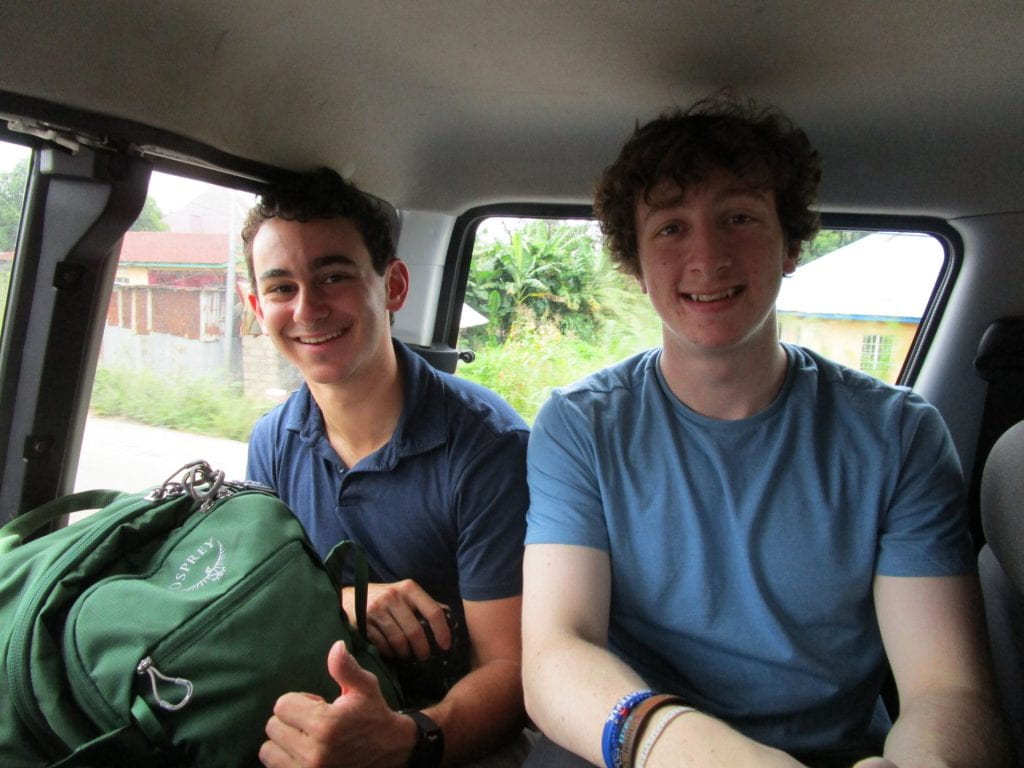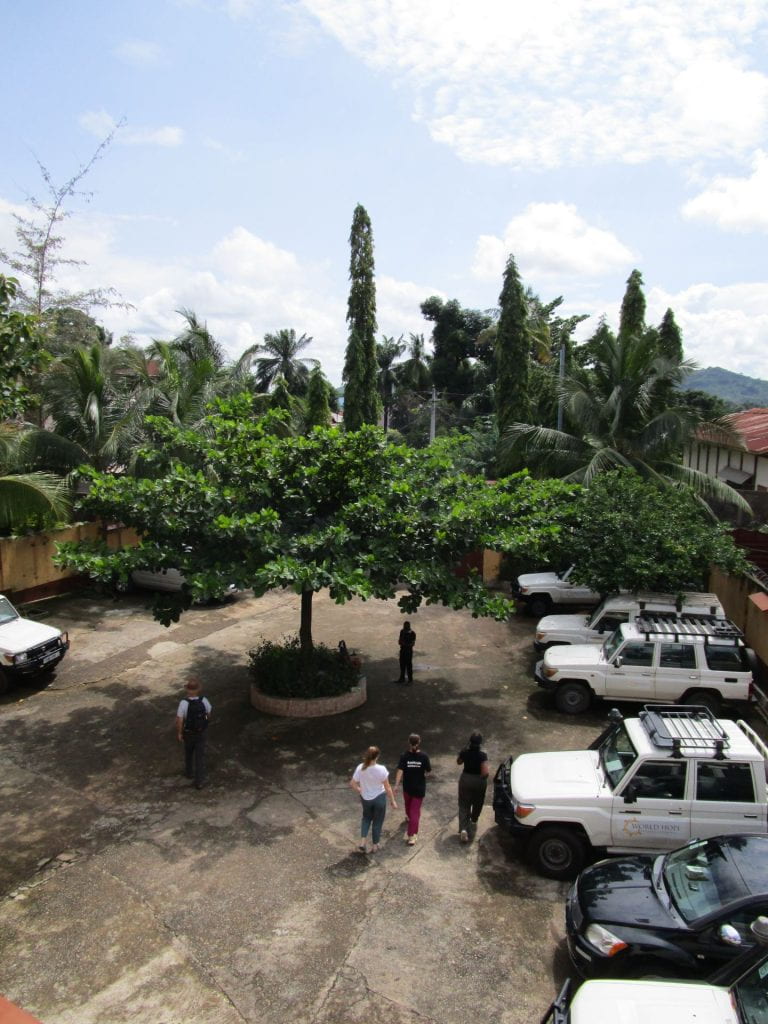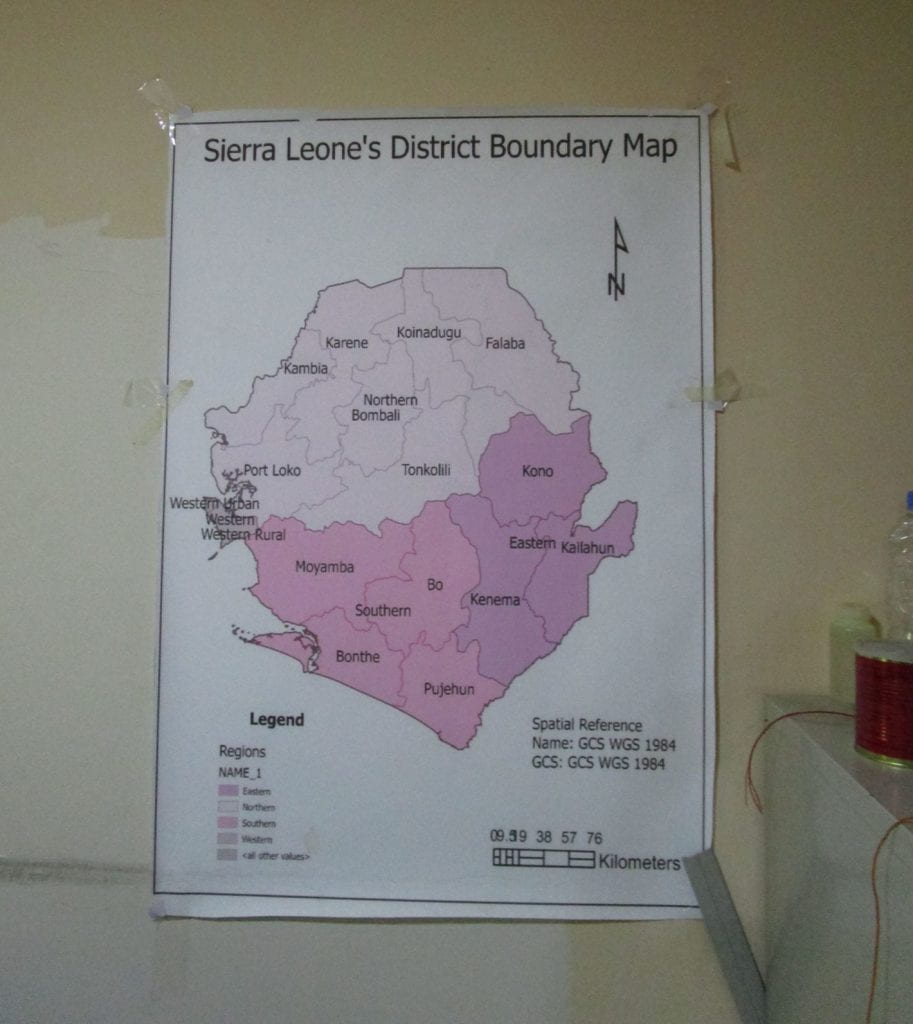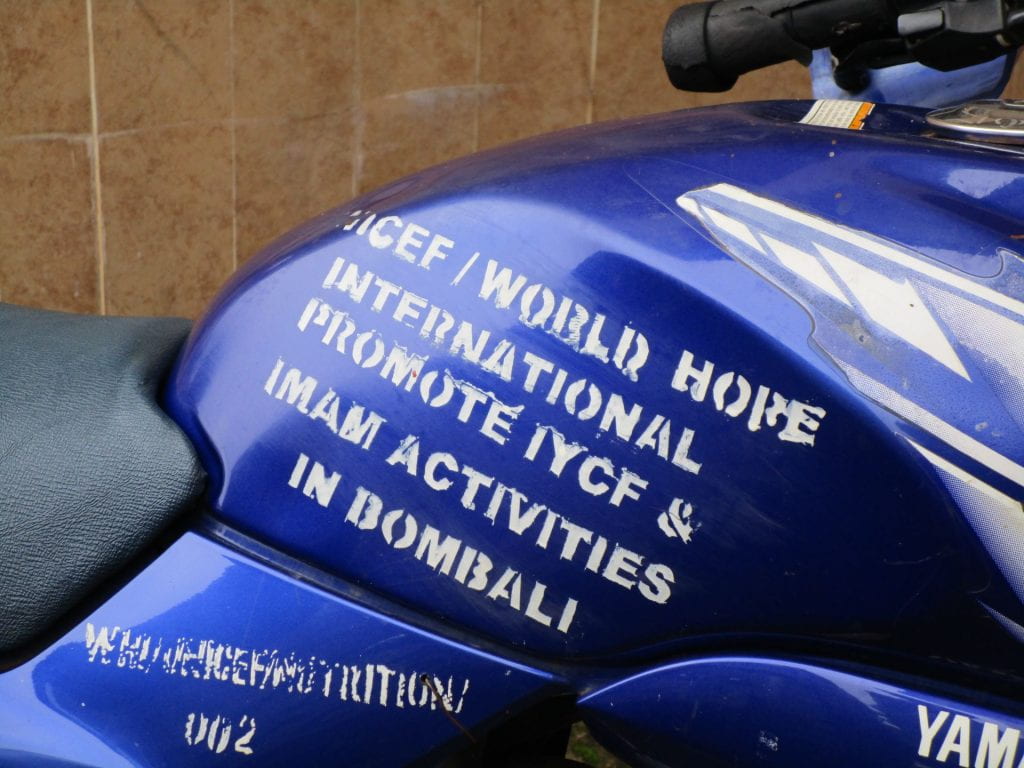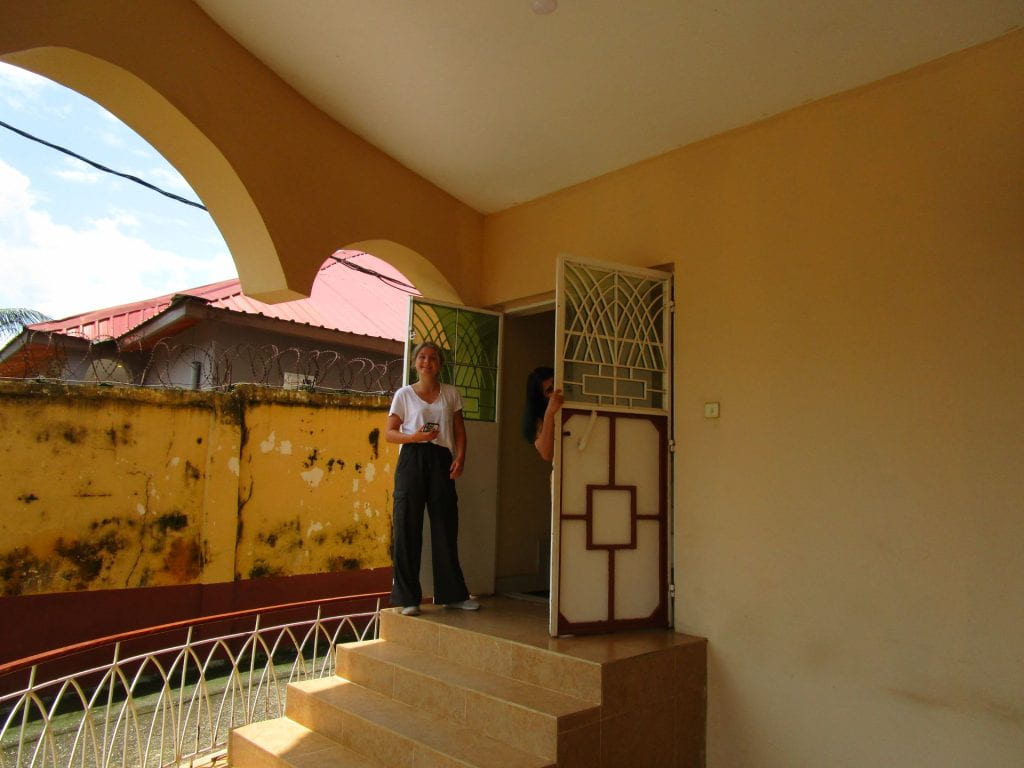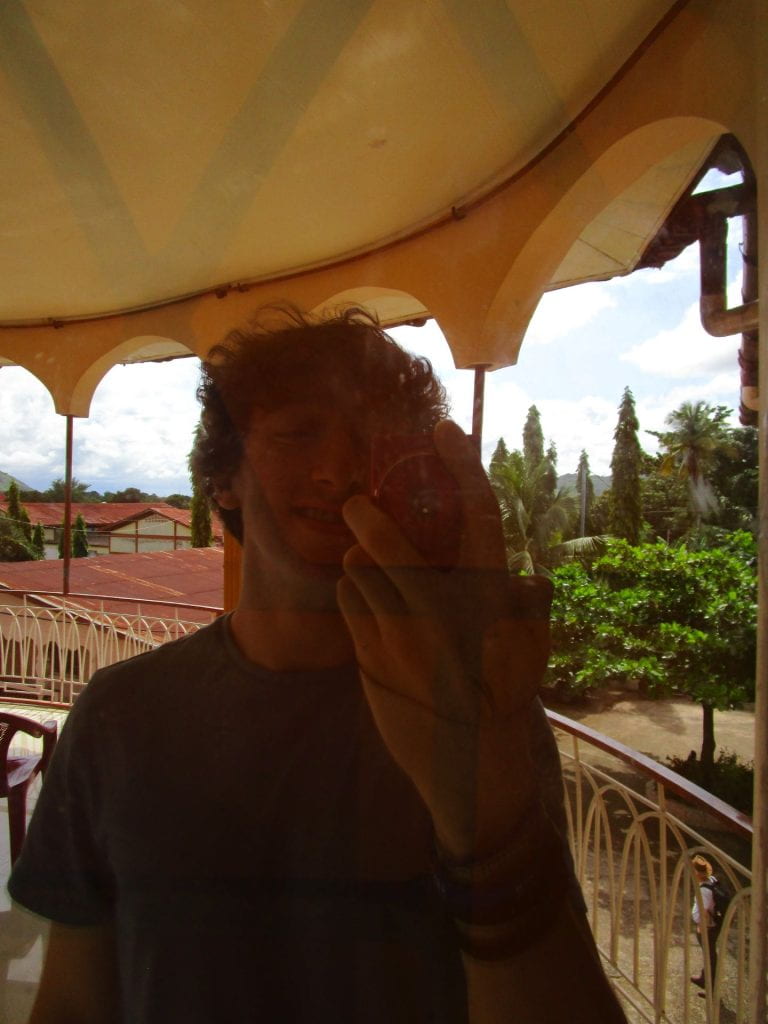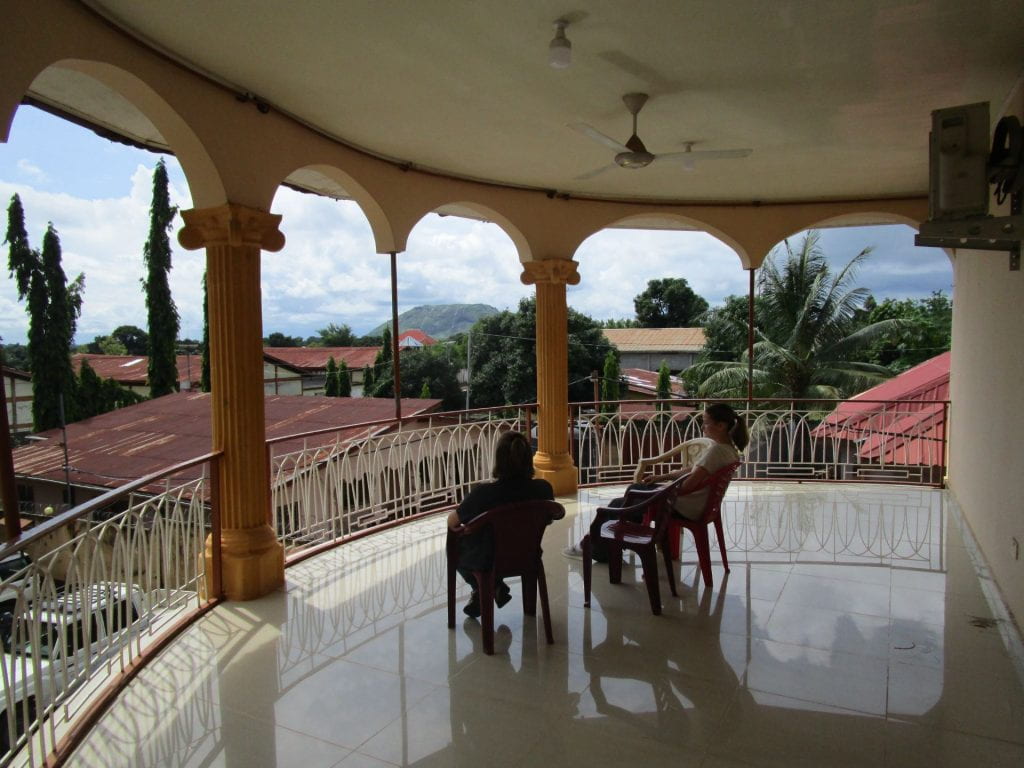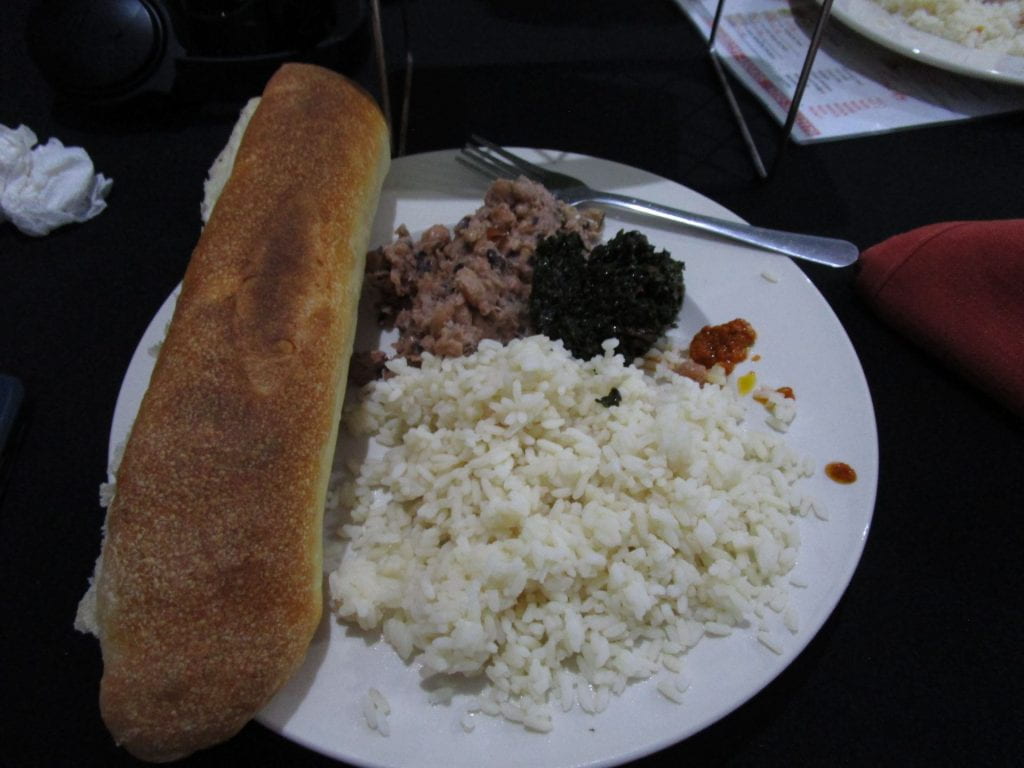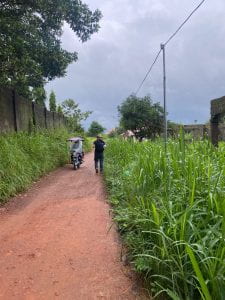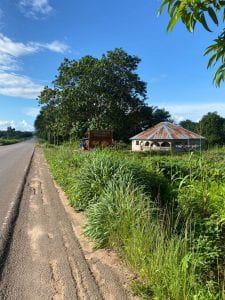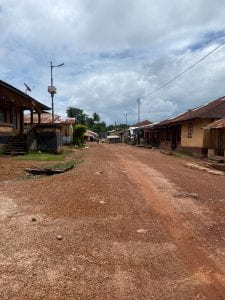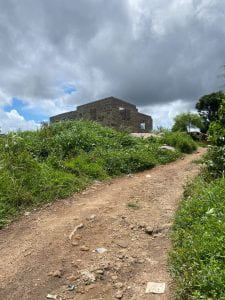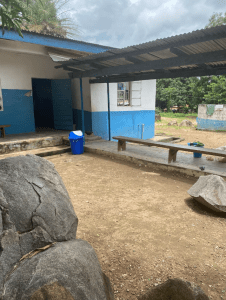Hello there! Today is Thursday, August 10th, 2023. This was the Ukweli 2023 team’s fourth full day in Sierra Leone.
A trend of the last two days has been cooler temperatures at nighttime and early morning. Wake-ups seem to be getting colder and colder. This never seems to matter as the sun rises in the morning, though. It is remarkable how consistent the temperature has been throughout the entire trip: high eighties, humid, and rainy. Rain is almost always interspersed, coming in short bursts in which the sun shines to evaporate and soak the air within the hour.
Today began the same as always: 7:45 am wake up, breakfast, then off to the World Hope International Office. Our team was excited because we had our first true fieldwork opportunity together! Around 10:00 am, we drove over to the Holy Spirit Catholic Hospital. This is a privately-owned Christian hospital with very plentiful and modern medical supplies and systems. Holy Spirit has a beautiful property and many different halls, as well as incredibly friendly staff. It certainly doesn’t fully represent the majority of health centers in the area or our project’s main demographic, yet we knew the setting itself could provide a lot of insightful information about a Sierra Leonean hospital.

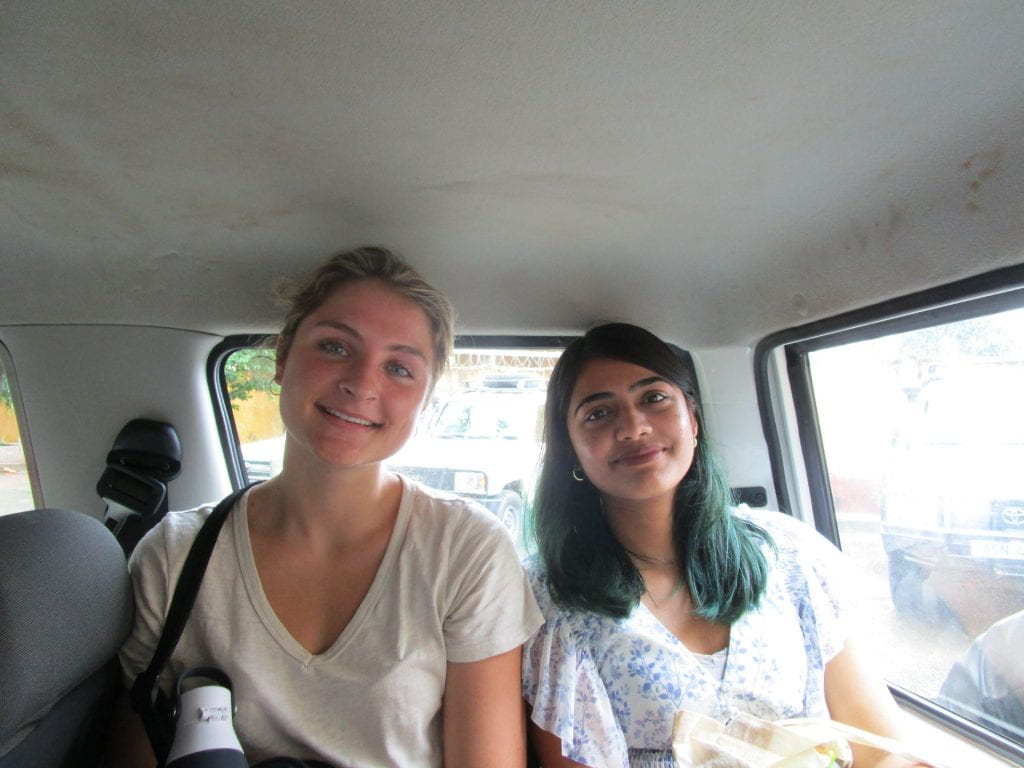
Rather than exploring each wing or talking to multiple doctors, we thought it was important to first introduce ourselves and talk a bit about who we are and what our project focus is. We got an introduction to the Deputy Matron, a young woman who was supportive of our research into cervical cancer awareness in women’s communities. It was great to have a conversation with a direct stakeholder of our project, someone whose community and own hospital inherits the direct effects of lacking cervical cancer education. If we find our data particularly interesting or have any questions regarding common threads we are seeing, we will get an opportunity to speak with her next week.
Despite her enthusiasm, there was an important lesson we experienced today in our first true on-site activity; it is imperative to have a value proposition and plan with each conversation that we take on. For a role as busy and essential as hers, just having a few minutes together was something we are incredibly grateful for. The meeting might not have been as mutually productive as we’d like though, because we still have no concrete research due to not being able to start yet. Nor actual physical content to show. Yet the realization that was demonstrated to us in respecting our own time–even without data, aiming to enter and exit a meeting with a set goal apart from introductions–was an important lesson that only could come through experience. We exchanged numbers, and she was incredibly cordial, so we hope to connect again if it would mutually benefit us. Maybe around the one-hundred interview mark, we can show her some of our findings!
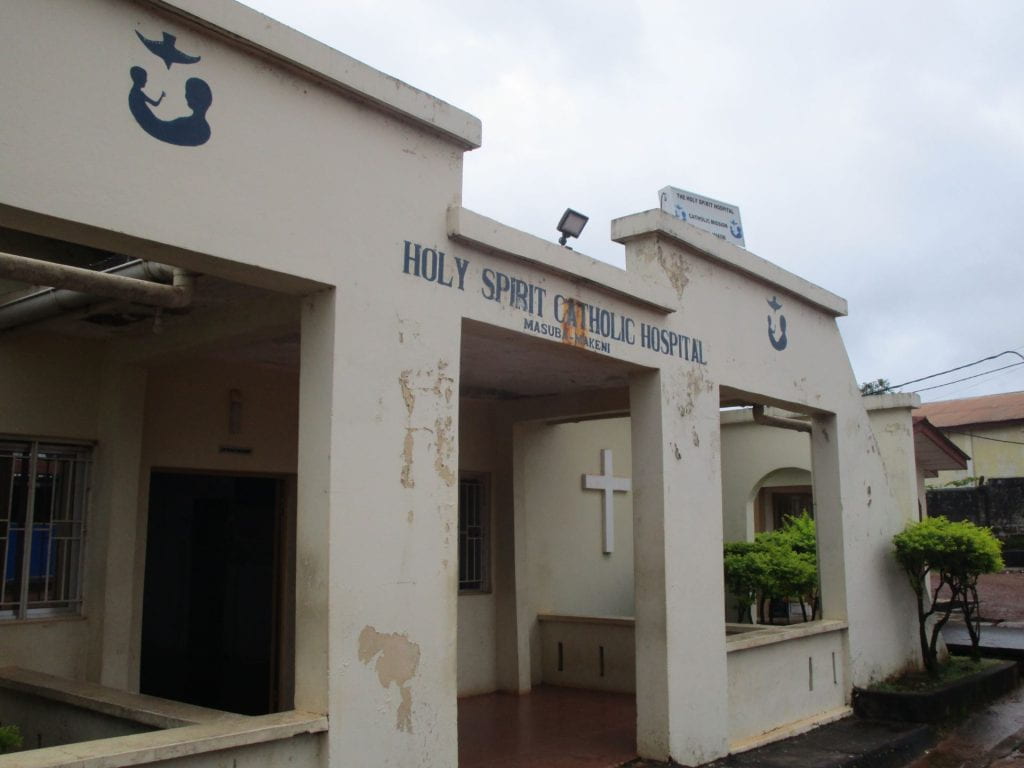
Holy Spirit Catholic Hospital’s entrance.
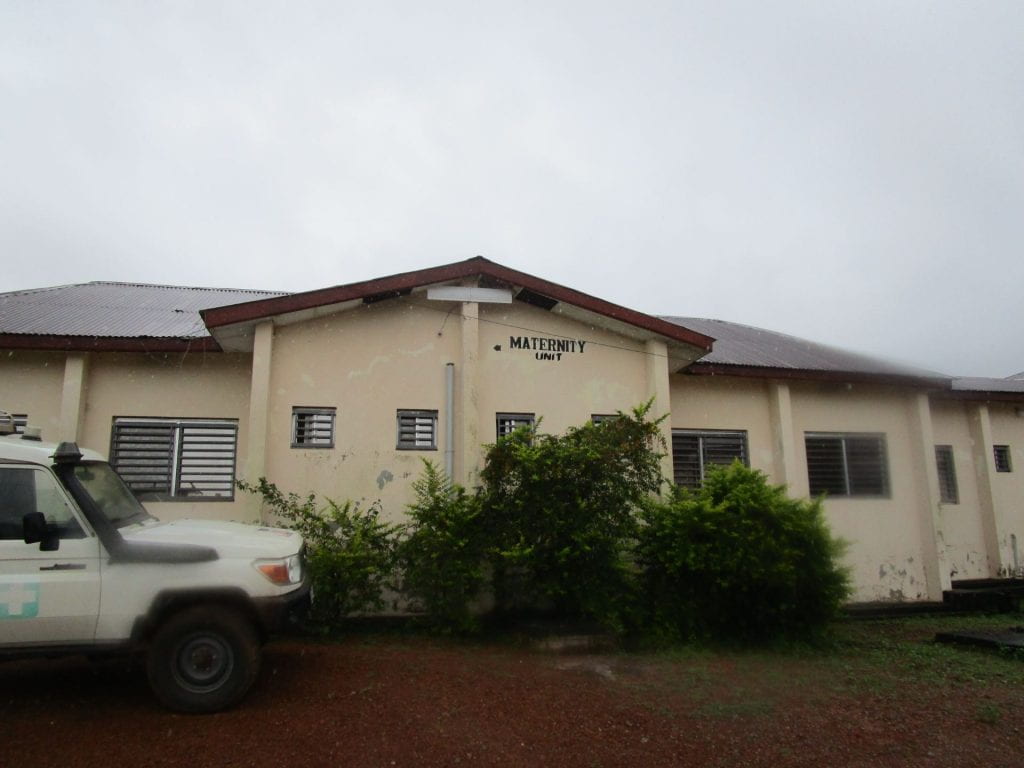
The hospital’s maternity ward.

Lively garden within the maternity ward.
We passed by a bustling marketplace on our way to the Holy Spirit Catholic Hospital. Local vendors were selling clothes and snacks all over. It was so interesting to see people carry their goods: they balance baskets on top of their heads! Shoes were displayed on the front porches of nearby crowded stalls, and we even spotted jewelry being kept safe inside a glass display. People all over are making their daily living. It’s a surreal experience to navigate these marketplaces in a vehicle, let alone on foot, and we’d get the chance to do just that this afternoon.
We returned to the World Hope International Office a bit before noon. Today, we held a mock interview session with Memenatu and Alieu. We invited two women from the office to hear the questions in Krio and let us know if they were understandable. It gave our translators great experience in what the fieldwork protocol will be like in action, consent protocol, and everything. Overall, we reviewed each of the twenty-five questions twice, giving each Memunatu and Alieu a chance to explore and explain each. Their enthusiasm and ability to nuance each question, providing analogies to make them more understandable, was awesome to see in action. We took a bunch of notes about which questions weren’t as clear as others. Because the questions were written in English and then translated into Krio, with a Krio answer being given and translated back into English, it is essential to be precise and explicit in the interviewees’ understanding of exactly what we are asking. When the questions use sophisticated medical language, it makes it especially difficult for what is being asked to be understood. There were a few standout questions that raised difficulty in Krio.
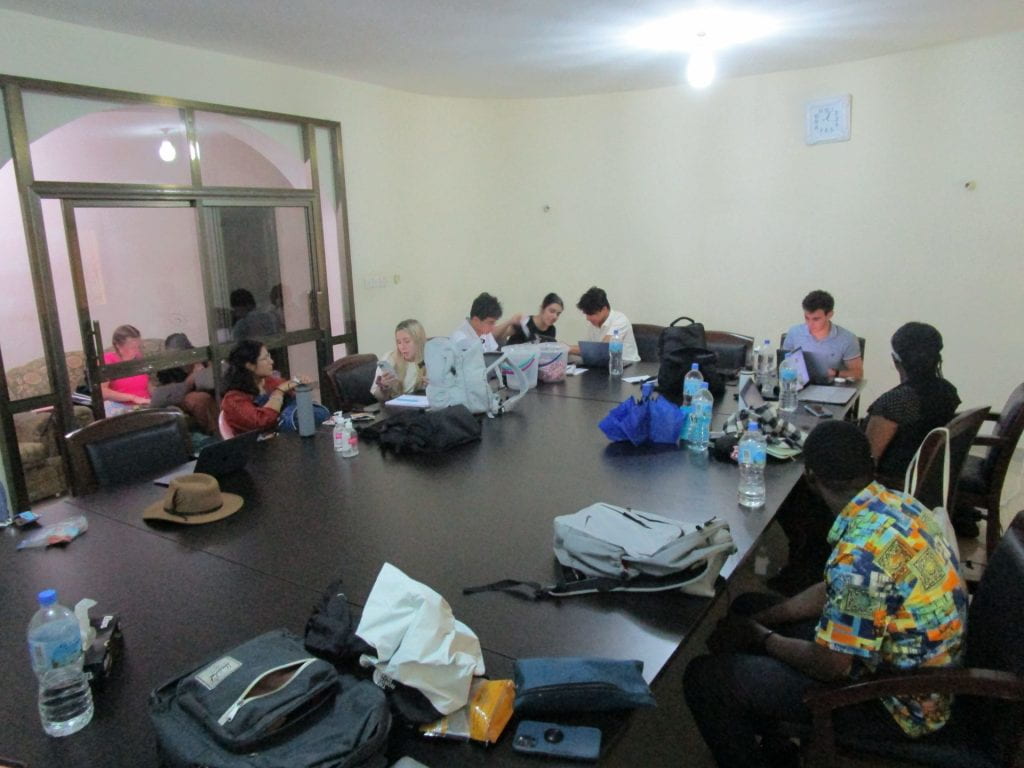
A look inside our office space!

We finally caught the banana saleswomen!
The first hard question was “What are the cultural or societal factors that contribute to the perception or understanding of cervical cancer in your community?”
The “cultural and societal factors that contribute…” section needed clarification and analogous explanation. This question is not intended to ask about sex practices or other habitual factors that directly cause human papillomavirus infection, but rather what stigmas, perceptions, and social influences may lead to a lack of engagement with understanding the health threat. We will figure out a way to ensure the proper questions are relayed–Memunatu and Alieu stepped up in helping get the right idea across. Their proficiency in both Krio and English is so useful!
The second difficult question was “What are some of the challenges related to cervical cancer prevention and the HPV vaccine that are unique to Sierra Leone?”
Due to the question’s phrasing, it does not translate very smoothly into Krio. The negatives of “challenges” and “prevention” make the question a bit tough, as well as “unique.” We believe it is important to understand if Sierra Leone faces her own troubles in fighting cervical cancer, but it can be asking quite a bit to have Makeni women (who may not have any knowledge of cervical cancer whatsoever) compare national challenges and describe them with distinction.

There’s perpetual rain in Makeni.
The last toughie was “Do you believe that women get equal chances in accessing healthcare?”
Speaking of inequality is difficult in Krio, and already difficult itself due to stigmatization. We were told that women would not always be openly willing to speak of these issues. In cases like ours, it is the priority to ensure privacy in our discussions. Regardless, the reason we chose “equal chances” rather than “equality” or “inequality” is because of the difficulty of translation. This question consistently needed an explanation, which is perfectly fine, however between our two mock interviews, there was such a significant disparity in the answer (one an enthusiastic no to any semblance of care disparity, the other a sorrowful yes that this is an issue faced). It is lastly important to make sure that when explained, these questions are not asking the women about their personal experience with inequality. While that is important and would certainly influence the answer given, we are not intending to ask “Do you believe you have experienced inequality as a woman,” but rather a broader examination of society. You can see where so many difficulties arise!
Explore the questions and their Krio translations below:
- How familiar are you with cervical cancer (cancer of the womb) and its causes? How familiar you dey wit cervical cancer (cancer of the womb) en wetin dae cause am?
- Have you heard about the HPV vaccine? If so, what do you know about it? You don hear about di HPV vaccine? If so, wetin you sabi about am?
- What are your perceptions or beliefs about the HPV vaccine? Wetin you belief about di HPV vaccine?
- Do you think cervical cancer is a significant health concern in Sierra Leone? Why or why not? You feel say cervical cancer na big health wahala inside Sierra Leone? Why you feel so or why you nor feel so?
- What are the cultural or societal factors that contribute to the perception or understanding of cervical cancer in your community? Which cultural or societal factors dey make people understand cervical cancer na u community?
- What are some of the misconceptions or myths about cervical cancer or the HPV vaccine that you’ve come across? You don meet any misunderstanding or myths about cervical cancer or the HPV marklate?
- Do you or anyone you know who received the HPV vaccine? You or anybodi way you sabi don take di HPV marklate?
- Do you think there is a need for more education and awareness programs about cervical cancer and the HPV vaccine in Sierra Leone? You feel say need dey for more education en awareness programs about cervical cancer en the HPV marklate inside Sierra Leone?
- Do you think cervical cancer is a significant health concern in Sierra Leone? Why or why not? You feel say cervical cancer na big health wahala inside Sierra Leone? Why you feel so or why you nor feel so?
- Have you or someone you know been affected by cervical cancer? If so, how has it impacted you or your community? You or person way you sabi don get any issue wit cervical cancer? If yes, how e don affect you or u community?
- How do you think the government or healthcare organizations can improve efforts to prevent cervical cancer and increase HPV vaccine uptake? How you feel say government for make effort for stop cervical cancer en make people take di HPV marklate more?
- What role do you think community leaders and organizations can play in raising awareness about cervical cancer and the HPV vaccine? Wetin you feel say community leaders en organizations for do for make people know about cervical cancer en the HPV marklate?
- What are some of the challenges related to cervical cancer prevention and the HPV vaccine that are unique to Sierra Leone? Which problems dae prevent cervical cancer in stop wan en taking the HPV marklate inside Sierra Leone?
- Would people shame or treat a woman differently if she had cervical cancer? If yes, how does it affect a woman’s willingness to go to the doctor? People kin shame or treat woman diffren if she get cervical cancer? How dis go affect in decision for see doctor?
- How do you envision the future of cervical cancer prevention and the HPV vaccine in Sierra Leone? How you feel say the future go be for stop cervical cancer en taking the HPV marklate inside Sierra Leone?
- Are there any cultural practices or beliefs in your community that affect women’s attitudes toward cervical cancer prevention or the HPV vaccine? You sabi any cultural practice or belief nar you community wey dae affect women attitude for stop cervical cancer or the HPV marklate?
- What sources of information do you trust when learning about cervical cancer and the HPV vaccine? Which source of information you dey trust wen you wan learn about cervical cancer en the HPV marklate?
- Do you have any fears about the HPV vaccine? What would make you feel better about the HPV vaccine? Yu get any fia bot di HPV marklate? Wetin yu tink say e for hap’n for reduce dem worrie ya?
- Do you think doctors have a lot of knowledge about the HPV vaccine? Yu tink se dokto dem get plenti sabi bot di HPV marklate?
- In your opinion, can the media raise awareness for cervical cancer and the HPV vaccine? Pan you tinking, yu tink se media fit du som tok-tok for mek pipul sabi bot cervical cancer en di HPV marklate?
- Are there any programs in your community that aim to prevent cervical cancer or promote the HPV vaccine? If yes, how effective are they? Den get any program we dey na yu community wey dem dey try for stop cervical cancer or mek pipul sabi bot di HPV marklate? If yes, how effective dem bi
- What are the main reasons why women in your community may not prioritize cervical cancer screening or the HPV vaccine? Which main reason you feel say di women nar you community nor dey put befo cervical cancer test or the HPV marklate?
- How do you think the government can encourage more women to get tested for cervical cancer and receive the HPV vaccine? How you think government for encourage more women for do test for cervical cancer en for take the HPV marklate?
- Do you believe that women get equal chances in accessing healthcare? Yu bi-lef say women get equal chance for receive healthcare?
- Would you be willing to vaccinate yourself or your child with the HPV vaccine? Yu go allow for, make yu or you pikin for take the HPV marklate?
After our interview practice, Professor Khanjan Mehta informed us that we had a special project to take care of. We have never been involved in a special project before, and I do not think anything could have prepared us for what was about to happen. At 4:15pm, rain poured down, we hopped in a truck and were off to the town square marketplace. Our mission: buy chives, eight onions, six small limes, eight avocados, a patch of peppers, and garlic.
Can you guess what for?
The marketplace was an unbelievable experience. Being a visitor to Sierra Leone, there are no ways to describe the sensory stimulation and concentration of personal interaction you experience in the packed alleys. You are shoulder to shoulder, stall to stall, trekking through mud, groceries in hand, and smiles all around! The vibrancy, noise, hollers, haggling, rain, and sea of eyes meeting Khanjan and his chef squad of Sterling Salmini, Reeza Chaulagain, and Brooke Lee… we have never experienced anything like it. What a one-of-a-kind blessing it has been to be immersed and welcomed into the richest parts of Makeni’s life. Generally, we are welcomed, met with hospitality, and immense interest. Our journey around every corner of the marketplace was unforgettable.

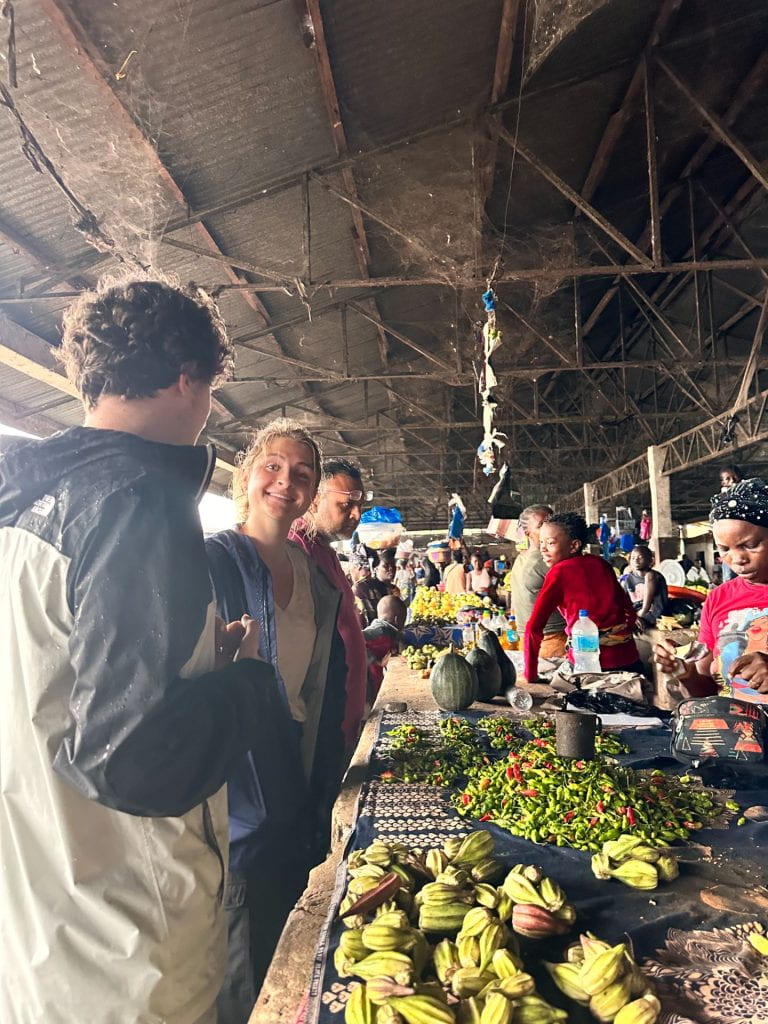
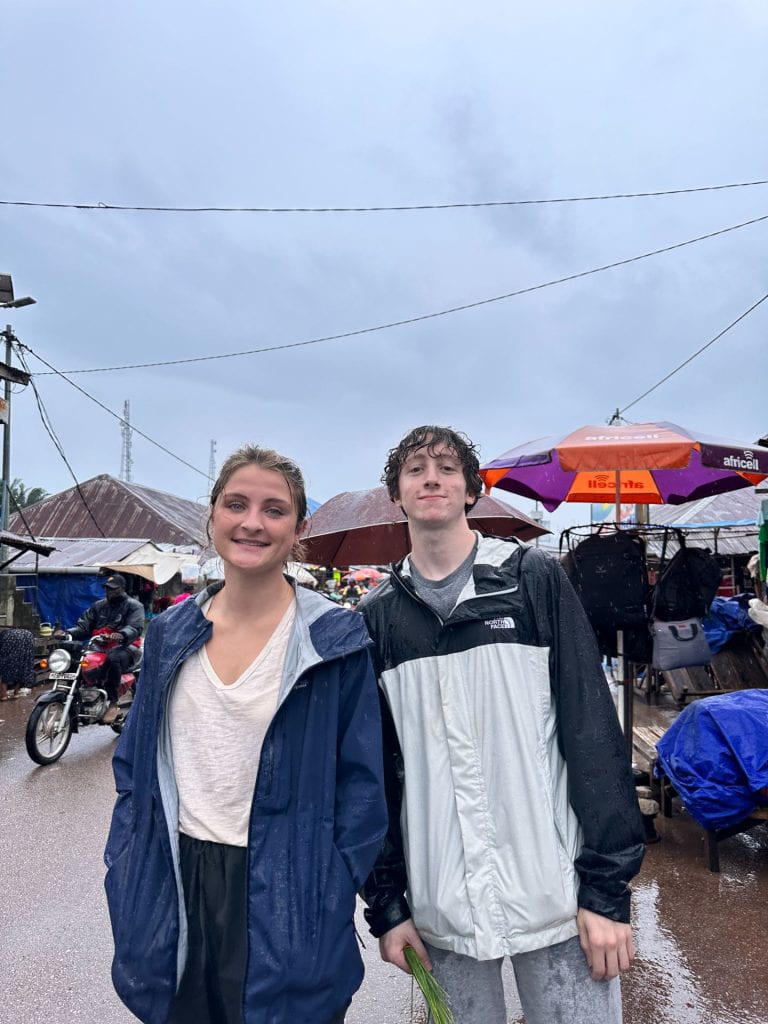
After we picked up our food and explored a bit, Khanjan directed us to the kitchen nearby our nightly dining space. The outdoor kitchen was in the backyard of a nearby family home. It had a charcoal stove, beautiful awning, clotheslines, empty buckets collecting every drop of rainwater, and an incredibly kind family who have been the gracious chefs of our nightly dinner down the road, something none of us knew. Precious, an eighteen-year-old daughter to the secret head chef, lent a hand in our task. No more perfect could the environment have been; we grabbed our chairs, set out bowls, and got to work peeling, chopping, mashing, mixing, and preparing the best guacamole we’d ever have.
There’s only one right way to do it, and that is in Sierra Leone.
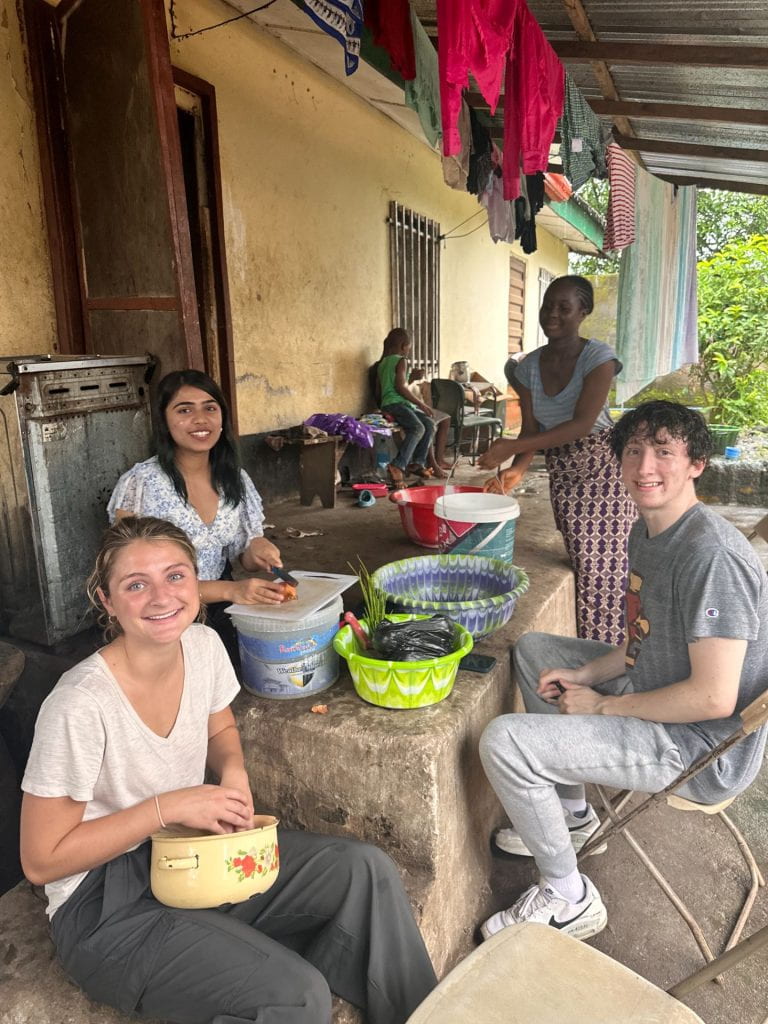
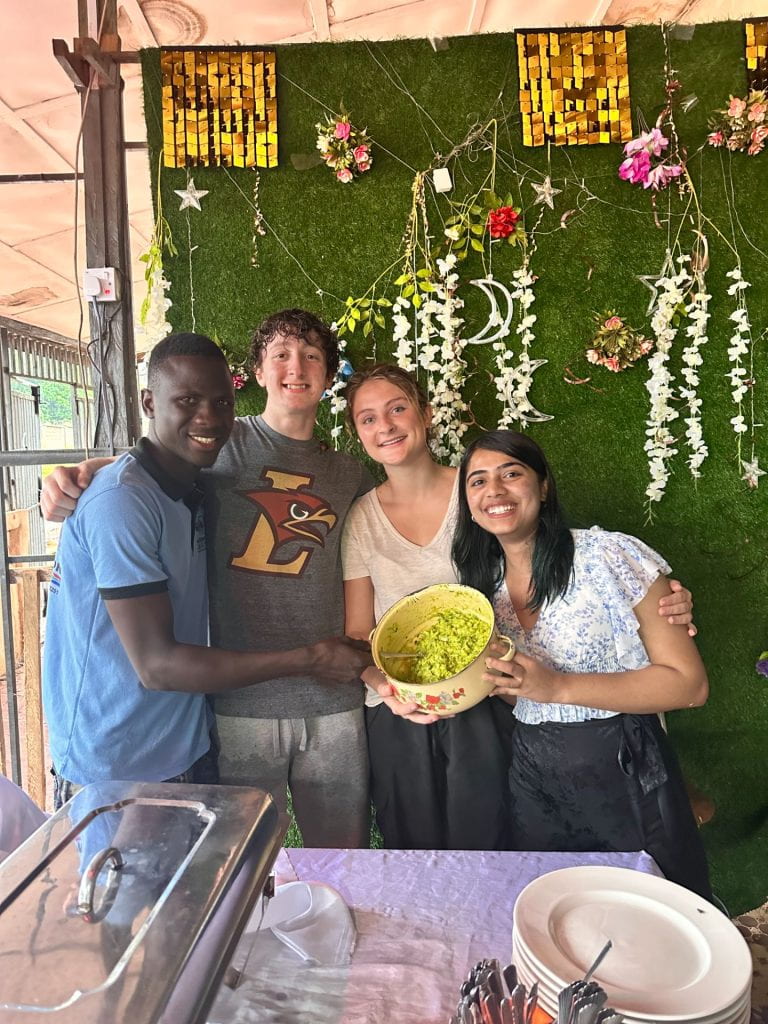
Our guac was served with dinner and the teams loved it. Cooking in Sierra Leone was a fantastic experience. It built up with the sensory experience of our day, being in so many interesting locations that command all of our attention and immersion. It’s in being able to interact in the environment, scouting out the best-looking onions and vendors who carry the peppers we need. It’s in the hands-on effort we get to share with others in preparing dinner. Efforts like these, from the hospital to the interviews to the market to the cooking, foster immense gratitude within us. It illuminates that every piece of the day we are accustomed to and the successes we often habituate to are not given: they are earned through someone’s dedication, and often their kindness. From the Deputy Matron to our translators, to Precious, every step of today showed that so many hands come together to craft our happiness. That is, undoubtedly, what Sierra Leone has taught us the most: there is an endless amount to be grateful for, and the most significant gratitude you can exhibit is getting your hands dirty, putting the work in, and sharing a laugh and smile.
Dinner went well, and so did our program-wide meeting upon coming home. Reeza and Sterling rematched in chess, and Sterling’s red side took it home this time.
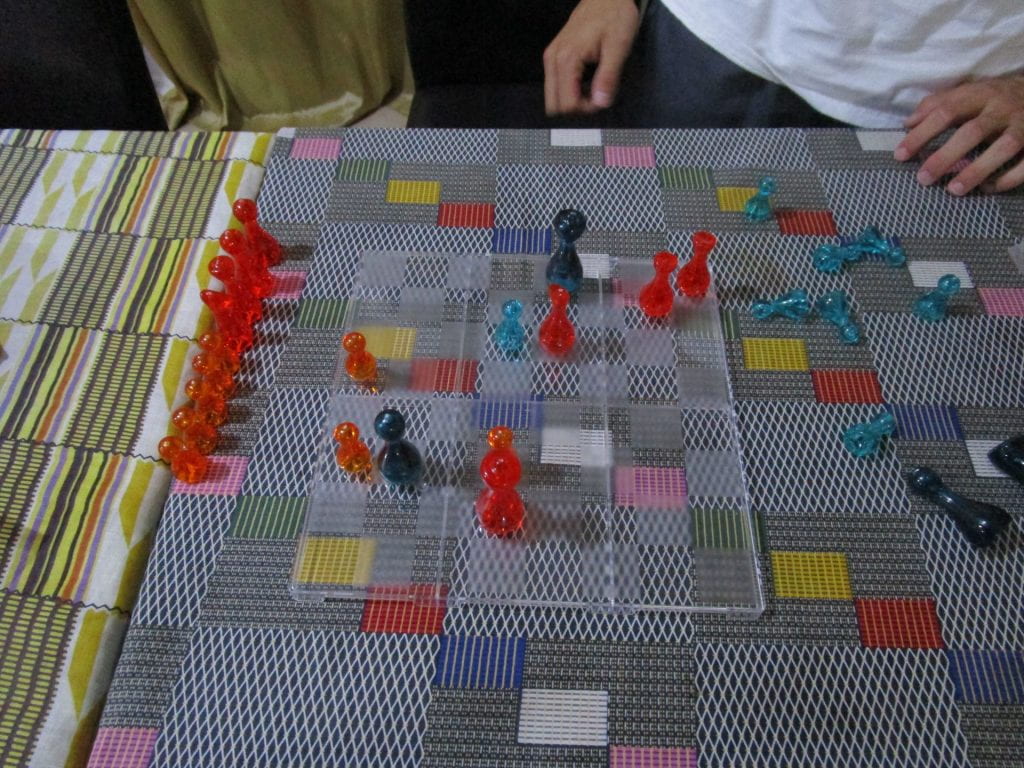
One for the good guys.
The game after, versus Jake Feuerstein of the Sickle Cell Education & Diagnostics team… Red wasn’t so lucky. Everyone’s getting a lot better!
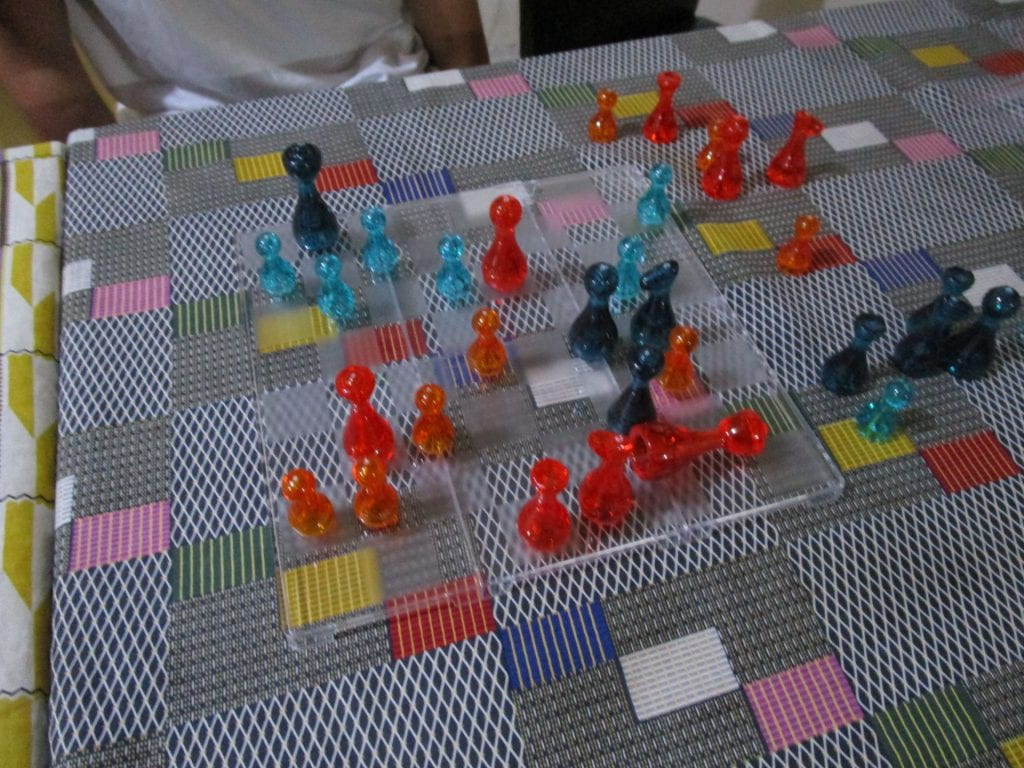
Blunder!
Thank you for tuning in today.
Until next time, yours truly,
Ukweli 2023











